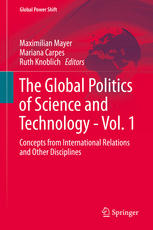 My book chapter which discusses the different way of how expertise in international relations has been studied is now available in print and online as part of the Handbook “The Global Politics of Science and Technology”. It will be an interesting read for anyone interested in the role of experts, politics and knowledge production as well as international organizations. The chapter provides an historical overview and argues that there are three generations of studying expertise in international relations.
My book chapter which discusses the different way of how expertise in international relations has been studied is now available in print and online as part of the Handbook “The Global Politics of Science and Technology”. It will be an interesting read for anyone interested in the role of experts, politics and knowledge production as well as international organizations. The chapter provides an historical overview and argues that there are three generations of studying expertise in international relations.
The role and functions of expertise in international politics is, since decades, a core research theme. This chapter outlines a history of how the relation between science and international politics has been approached through the lenses of expertise. My intention is to offer a heuristic device. I argue that the debate can be structured in three generations. A first generation is interested in experts as actors that have a causal influence on international politics. The second generation scrutinizes discourses of expertise and their constitutional role in making the international. And the third generation concentrates on practices of expertise and the way these perform the epistemic arrangements of the international. To think about the study of expertise in the frame of three generations each offering different insights and carrying advantages and problems provides not only a practical tool for sorting ideas, but clarifies what one ‘buys in’ by following a specific generation.
The chapter is either available here or as pre-print here.